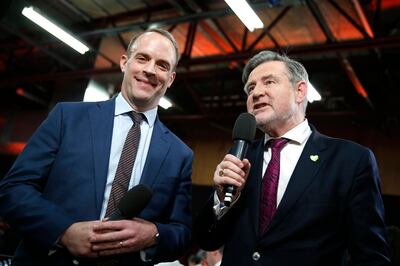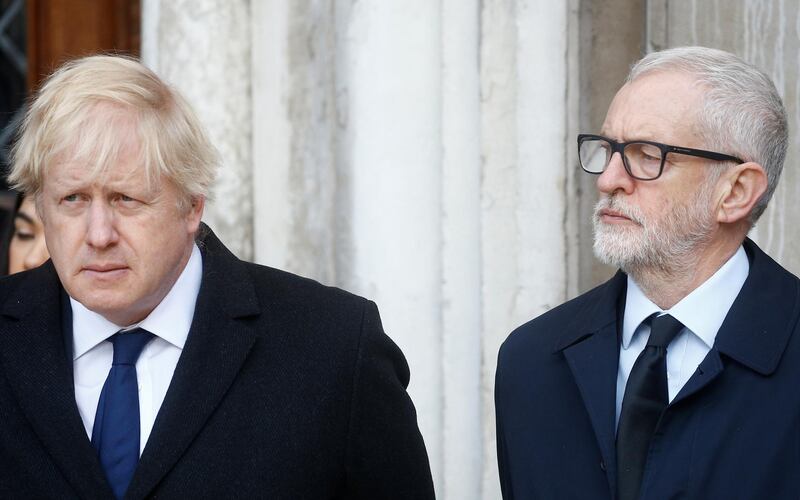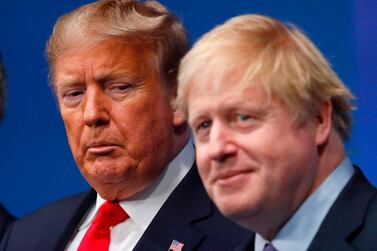It is British general election week and I am in a local food shop listening to a lively conversation about voting intentions between the owner and customers.
“So have you decided?”
“Not really.”
“Why not?”
“I hate them all.”
(Laughter.)
“Me too.”
“How about Corbyn?” (Jeremy Corbyn, the Labour party leader.)
“Useless.”
“Boris?” (Boris Johnson, the Conservative leader who is ahead in the opinion polls.)
“I don’t believe a single word he says.”
"How about you?"
"I'll hold my nose and vote the least worst."
"Which is?"
(Shrugs.)
“I’m not sure."
(More laughter.)
I know the regulars here. One comes from a family that supports the ruling Conservatives. Another has in the past suggested to me he is a Labour supporter. Or was. It is not clear. Many people really are undecided. It is a good-natured discussion and they all seem to agree on one thing: Britain is not well served by its political leaders.
The voters’ choice is between two leaders millions of us do not much like. This election has been a series of paradoxes. It is the most important election in recent memory – but the least exciting.
Mr Johnson, the prime minister, claims he will “get Brexit done”. But Brexit is a process, not an event – and that process will probably take years of negotiations with the European Union, the US and other countries. We are also entrusting the biggest decision since the Second World War to leaders who are not much trusted. Over the past three months, I have travelled to public political meetings in Scotland, Northern Ireland and England. Everywhere voters say they simply do not trust or believe they are being told the truth.

Mr Johnson is repeatedly asked by interviewers why anyone should trust him. Television audiences laugh when he protests he is trustworthy. His former allies in Ulster's Democratic Unionist Party say he has betrayed their trust in him. One of his key ministers, the foreign secretary Dominic Raab, even declared on BBC radio that it was "ludicrous" to suggest he was in favour of privatising the British National Health Service, despite the fact that Mr Raab is famous in political circles for being one of the authors of a booklet suggesting precisely that.
As for Mr Corbyn, he is often asked whether he has found a "magic money tree" to pay for all his political promises. TV audiences groan at some of his answers and opinion polls tell us he is the least popular Labour leader in history.
Beyond the scepticism of voters, two outcomes look possible.
One is a Conservative majority government. But Mr Johnson – notorious for his carelessness with facts and details – will then have to begin the most complex negotiations undertaken in recent memory against a self-imposed deadline of December 2020 to finalise a deal with the EU. Trade negotiators say it is simply not possible. But – another paradox – Mr Johnson’s reputation for telling lies may actually help him here. If his deadline proved to be just as phoney as other promises he has made, voters will probably just shrug and reflect that they did not believe him anyway.
The other possible election outcome is a “hung parliament” – no party winning a majority. Mr Corbyn could become prime minister backed by a coalition of other parties for a limited time, or he might step aside in favour of a new Labour leader. Either way, 2020 will continue to be dominated by Brexit and a hung parliament is likely to produce another referendum and another general election.
So despite the joys of Christmas, many British people are fed up with all this and all “them” – the politicians.
I have met and interviewed British prime ministers going back to Margaret Thatcher – including John Major, Tony Blair, Gordon Brown and David Cameron – plus others leaders such as Angela Merkel of Germany, Jacques Chirac of France and Bill Clinton of the US. Sadly, Mr Johnson and Mr Corbyn are two of the least impressive political leaders I have ever come across. True, they have some admirers. Their words charm some of the party faithful. But it is difficult to think of any truly significant achievements from either of them.
Our country, formally called the United Kingdom of Great Britain and Northern Ireland, is a truly competent and inventive place where we like to solve problems rather than create them. Our schools and universities are admired round the world. Our inventiveness and cultural strengths are internationally famous. Whatever happens in Thursday’s election, Britain deserves better than the dismal choice which is before us – and yet there are some glimmers of hope.
One is the recognition, especially among young voters, that something has to be done about the mediocre people who rise to the top in British politics. The shock of witnessing untrustworthy and incompetent leaders has led many young people to register to vote. More than 600,000 – mostly under 35-year-olds – signed up on the last day registration was legally possible.
Moreover, while some politicians foment anger and bitterness, most Brits – like the customers in my local food shop – just want to get along, work together and prove that in the end, Britain is better than Brexit.
Gavin Esler is a journalist, author and presenter






